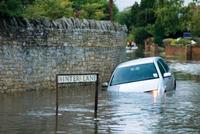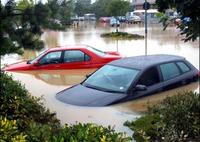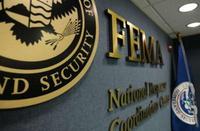-
New research into flood impacts in the South of England -

Researchers have developed and applied a method for understanding the effects and impacts of coastal flooding across the south coast of the United Kingdom, which could contribute to more effective flood forecasting, defense design, and land use planning
-
-
Laser beams shine light on nature’s extreme events

“Extreme” events in nature, such as hurricanes, tsunamis and bushfires, may be more commonplace and predictable than you might think; researchers are using lasers to study how frequently extreme events happen, and their work highlights that in nature, “extreme” does not have to mean “rare”
-
-
New Red Cross first aid app brings safety tips to smart phones
The American Red Cross today (Wednesday) launched its official first aid app, putting free lifesaving information in the hands of smart phone users. The Red Cross says this app is the first in a series to be created by the organization
-
-
New research to improve protection and recovery from major floods

As parts of the United Kingdom suffer further flooding with more heavy rain forecast, three research projects funded by the Engineering and Physical Sciences Research Council (EPSRC) could radically change the way U.K. government and local authorities prepare for and respond to floods, mitigating future risks
-
-
Fire risks to increase in some regions of the world
Climate change is expected to disrupt future fire patterns around the world, with some regions, such as the western United States, seeing more frequent fires within the next thirty years; at the same time, fire activity could actually decrease around equatorial regions, particularly among the tropical rainforests, because of increased rainfall
-
-
Guidelines for securing business records in hurricane season
A data protection specialist developed best practices guidelines to assist businesses along the Atlantic coastline to assess their business continuity in preparation for the hurricane season
-
-
London’s financial district employees say City unprepared for Olympics

Nearly 70 percent of investment bank staff think that the City, London’s financial district, is lagging behind in preparation for the Summer Olympic Games, with nearly half of respondents unsure whether their company has a Business Continuity Plan (BCP) in place
-
-
AT&T receives DHS disaster preparedness certification
AT&T said Friday that it is the first company in the United States to earn DHS certification for disaster preparedness; AT&T’s certification is the first under the DHS Voluntary Private Sector Preparedness Program, designed to enable private sector organizations to enhance their capabilities for planning, responding to, and recovering from natural disasters and other threats
-
-
Floating dock from Japan carries potential invasive species
When debris from the 2011 earthquake and tsunami in Japan began making its way toward the West Coast of the United States, there were fears of possible radiation and chemical contamination as well as costly cleanup; a floating dock that unexpectedly washed ashore in Newport, Oregon, earlier this month, and which has been traced back to the Japanese disaster, has brought with it a completely different threat — invasive species
-
-
Deadly Italy earthquakes result in $6 billion economic loss
Two earthquakes and subsequent aftershocks struck northern Italy within a 9-day period, killing twenty-five people, injuring more than 400 others and causing extensive damage to the cultural heritage throughout the Emilia-Romagna region of Italy, in addition to businesses and personal property; prolonged periods of rain affected China throughout the month of May, with at least 143,000 homes damaged or destroyed
-
-
Bolstering SMBs’ disaster preparedness
Small and medium business (SMB) in the United States are not ready for natural or man-made disasters, and for the consequences of such disasters; this is worrisome, because for a small business a disaster can be potentially devastating; being prepared can sometimes mean the difference between surviving and sinking
-
-
ISO offers new standard for business continuity management
Incidents take many forms ranging from large scale natural disasters and acts of terror to technology-related accidents and environmental incidents; the International Organization for Standardization (ISO) has published an international standard addressing business continuity management to contribute making organizations in both public and private sectors more resilient
-
-
Mentoring small business in disaster resiliency

In January 2012, FEMA announced a new campaign Small Business is Big, aimed to increase outreach and educational opportunities to small businesses in the emergency management arena; a new private-industry program, the Business Emergency Management Mentorship, is directly inspired by this FEMA campaign and is an effort to help small businesses often lacking the resources to be better prepared for all-hazards disasters
-
-
Hurricane Ike damage analysis point to vulnerable Texas bridges
Preliminary results from a new research show more than a dozen Gulf Coast bridges on or near Galveston Island would likely suffer severe damage if subjected to a hurricane with a similar landfall as Hurricane Ike but with 30 percent stronger winds
-
-
Insuring against Olympic cancelation
Starting on 27 July, the 2012 Olympic Games in London will see more than 10,000 athletes from nearly 200 different nations compete in 302 disciplines; nine million spectators are expected at the competition venues, while between three and four billion people will follow the spectacle on television; if the Games were called off as a result of terrorist act or another disaster, Munich Re would provide cover of around 350 million euros through several policies
-
More headlines
The long view
The Surprising Reasons Floods and Other Disasters Are Deadlier at Night
It’s not just that it’s dark and people are asleep. Urban sprawl, confirmation bias, and other factors can play a role.
Why Flash Flood Warnings Will Continue to Go Unheeded
Experts say local education and community support are key to conveying risk.
